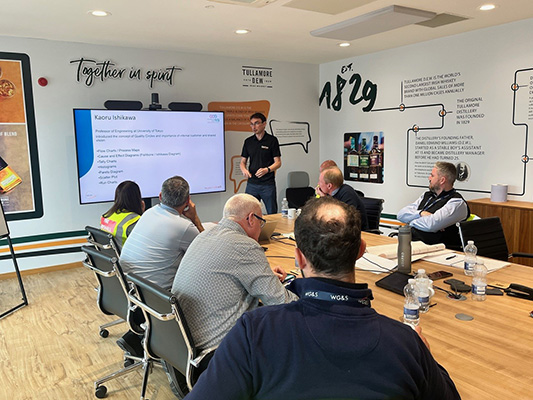While renewable energy is vital it won’t make manufacturing sustainable. Addressing waste and inefficiency is crucial to environmental targets.
By Steve Adams, CEO of LineView
Climate change is one of the biggest challenges facing humanity, and every industry, especially manufacturing, must reckon with its global impact. Despite economic challenges, 77% of food and beverage (F&B) businesses are willing to invest in sustainable solutions. These commitments reflect the growing pressure to meet ambitious COP28 sustainability targets. Additionally, consumer preferences are increasingly being influenced by companies’ ‘green’ credentials with 53% willing to pay 10% more for sustainable food and drinks, pressuring manufacturers to implement sustainability measures.
While many manufacturers have adopted renewable energy solutions, only 15% of F&B companies reporting to CDP are on track to meet their sustainability targets. Sustainability involves more than just reducing carbon emissions. A few minutes of walking around a factory floor reveals a fundamental sustainability issue – waste. Inefficient production is leading to water, energy, food and material waste. With waste levels set to rise by two thirds and its costs to almost double within a generation, addressing this manufacturing process challenge is crucial to protect the planet.
Manufacturing is energy-intensive, with electricity accounting for around 20% of the sector’s final energy use. Renewable energy resources are undeniably an important part in reducing the carbon footprint of energy consumption in the industry. The sector has made significant investments in these technologies. For instance, Heineken invested £25 million into making their Manchester brewery more sustainable, including the installation of heat pumps. However, while these solutions address carbon intensity, they don’t solve the growing issue of excessive waste.
The manufacturing industry’s environmental impact extends beyond energy sources with industrial waste accounting for at least 50% of waste generated globally.
F&B loss and waste alone makes up around 8% of global greenhouse gas emissions, primarily caused by inefficient manufacturing processes. Waste and Resources Action Programme (WRAP) data indicates that 16% of all food waste in the UK comes from inefficient manufacturing processes. This doesn’t even account for the waste resulting from manufacturing errors caused by these inefficient processes. For instance, in 2022, AG Barr had to recall its Irn Bru glass bottles due to a manufacturing fault causing bottle caps to pop off unexpectedly.
Furthermore, the F&B industry is extremely water intensive, ranking as the third largest industrial user of water. Reducing water usage can lower energy costs and treatment needs benefiting both the environment and business operations.
Efficient use of resources and waste reduction are not only beneficial for the environment but also business operations. According to WRAP, the UK F&B manufacturing sector could save over £400 million annually by adopting simple measures to reduce waste and improve resource efficiency.

Inefficiency is one of the most preventable sources of manufacturing waste. Increasing manufacturing efficiency is largely a data problem and thanks to advances in machine learning and artificial intelligence, along with human ingenuity this is now more fixable than ever.
The first step is tracking and measuring waste. Tools like line monitoring and operational equipment efficiency systems allow manufacturers to identify how product waste is happening, and where to invest for improvements. This approach not only helps in setting realistic waste reduction goals but also enables continuous improvement.
Implementing holistic technology such as line balancing optimisation (LBO) can also reduce waste by enhancing equipment maintenance and performance, and reducing downtime. By improving overall productivity and mapping out waste sources, LBO minimises waste and increases profit. And the potential is significant, given Aberdeen’s research finding companies lose an average of $260,000/hour to downtime.
Continuously evaluating a factory’s optimisation is essential for waste minimisation strategies. Regularly reviewing performance data, staying updated on new technologies and industry trends allow manufacturers to refine their approach.
However, using this data requires sophisticated IT infrastructure and expertise, which can be a barrier for companies rooted in traditional methods. Shifting to more efficient practices not only requires new technology but also a change in mindset and culture. Through training programmes employees can feel empowered to recognise and address inefficiencies, fostering a culture of continuous improvement and waste reduction.
The manufacturing industry’s journey towards sustainability is complex. Renewable energy alone is not enough. The manufacturing industry must also tackle the fundamental challenge of waste and inefficiency. Manufacturers must strategically invest in new technologies and foster a culture of continuous improvement, to reduce waste and meet their sustainability targets, gaining a competitive edge in an increasingly eco-conscious market.

Steve has over 30 years of experience in global supply chain management. As Former Vice President of Supply Chain at Coca-Cola European Partners, Steve has operated at all levels of the supply chain.
Scott Ellyson, CEO of East West Manufacturing, brings decades of global manufacturing and supply chain leadership to the conversation. In this episode, he shares practical insights on scaling operations, navigating complexity, and building resilient manufacturing networks in an increasingly connected world.